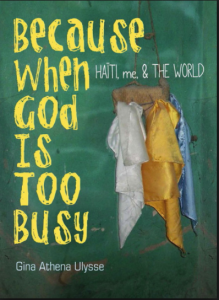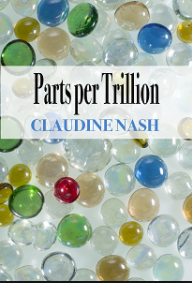THE BACKSTORY by Gina Athena Ulysse & Claudine Nash ’92
The stories behind the words: Poems from Gina Athena Ulysse (“I am a storm,” from Because When God Is Too Busy) and Claudine Nash ’92 (“The Problem with Loving Ghosts,” from Parts per Trillion).
GINA ATHENA ULYSSE
Because When God Is Too Busy: Haiti, Me & The World
(WESLEYAN UNIVERSITY PRESS, 2017)
Gina Athena Ulysse is an anthropologist, performance artist, and multimedia artist. She is professor of anthropology at Wesleyan University.
“I am a storm” is the oldest piece in my latest book of poetry, performance texts, and photographs. It is a song I wrote when I was sixteen years old during my wannabe rock star years. I have vivid memories of holding a fake microphone and belting out the hook, sometimes with tears streaming down my face. I always think of it as my personal anthem. Over the years, I figured out it was about self-acceptance and selflove. I recognized with my rebel spirit, I would always be dissent in the mainstream of our unjust world. My acute sensibilities, righteous anger, and unrelenting commitment to social justice often put me at odds with power. One must be fearless and have conviction to usher in change that at times demands great sacrifices. I reworked the second stanza of the lyrics in 2010 to honor Haiti’s place as the avant-garde, given the global significance of the Haitian Revolution. The earthquake was another one of those moments in history where great change was possible.
Music and poetry, and the arts in general, are central to my professional work now, which is primarily performance oriented. I refer to myself as an artist-anthropologist-activist because of the immense value I place on the arts, not simply for their transformative possibilities, but as an infinite organic source of connection and contemplation. —GAU
I am a storm
BY GINA ATHENA ULYSSE
showers of teardrops
are falling
they carry memories
of the beginning
when shadows of the wind
wrap the sky with its clouds
when the aged innocence
released her anger
she declared me a storm
I am a storm
I am a storm
I am thunder
I am lightning
I’m the grey
I’m the grey
I am thunder
I am lightning
I am the one you will call
when the guards are changing
there’s no beginning
without ending
you are the one they call
the world needed changing
shadows of the wind
wrapped the sky with your clouds
and the aged innocence
released her anger
and made you into a storm
You’re a storm
You’re a storm
You are thunder
You are lightning
You are grey
You are grey
You’ve been thunder
You’ve been lightning
You’re the one they call
World needed changing
no new beginnings
without ending
you are the ones we’ll call
when the guards need changing
when shadows of the wind will
wrap the sky with its clouds
and the aged innocence
released her anger
and declared you a storm
I am a storm
You’re a storm
We are thunder
We are lightning
We’re the grey
We’re the grey
We are thunder
We are lightning
We’re the ones that they call
when the world needs changing
—from Because When God Is Too Busy: Haiti, Me & The World, by Gina Athena Ulysse (Wesleyan University Press, 2017)
(ALDRICH PRESS, 2016)
Claudine Nash is a New York-based clinical psychologist and the author of three collections of poetry.
Although poetry was my first love, I put writing aside for many years to focus on a psychology career working with people suffering from schizophrenia and other forms of severe and persistent mental illness. However, poetry always remained part of who I was and I never stopped hearing it in the words of the people whom I had the honor to treat. When I eventually started writing again, I found my poems deeply impacted by the years of bearing witness to loss, longing, and the complexity of human emotion.
No doubt influenced by my experience as a double English and psychology major at Wesleyan, my psychology and poetry practices very quickly became intertwined as I set out to write poetry meant to inspire healing.
“The Problem with Loving Ghosts” was part of a series of poems that I wrote about the liberation that accompanies releasing the memories, feelings, or patterns of behavior to which we cling even though they may no longer serve us in our present lives. My poems often start to take form when a quirky image pops into my head while I’m busy doing something else. This one began with the image of a noisy and disruptive ghost from the past occupying the adjacent seat in a movie theatre.
I’ve always loved poetry for its parsimony and ability to cut straight to the heart in a handful of words. It’s why I find it to be such an incredible tool for connecting us to the feelings that lie just beneath the surface. It calls upon us to understand ourselves and others. In these divisive times, we need poetry not only for our own personal healing, but to help us empathize with each other’s emotional and societal experiences so we can appreciate our different realities as well as our common humanity.—CN
The Problem with Loving Ghosts
BY CLAUDINE NASH ‘92
The problem with loving ghosts
is that they rarely keep up
with politics. That nice
Prosecco you were saving
passes right through them
and they emit a somber
charge when your fingers
stretch to touch their cheeks
They leave fragments of
crushed coral and seaweed
all over your travertine floors
and when you take them to
the chamber orchestra or
latest foreign film, they rattle
or float from their seats so
you can’t read the subtitles.
They can’t drive your stick shift
to the emergency room
when that new antibiotic makes
your eyes swell shut or leaves
your legs and arms a messy
mound of hives. And no matter
how many millions of times
you remind them, when
they roll through your heart
they tend to leave
the door ajar.
—from Parts per Trillion, by Claudine Nash ’92 (Aldrich Press, 2016)




